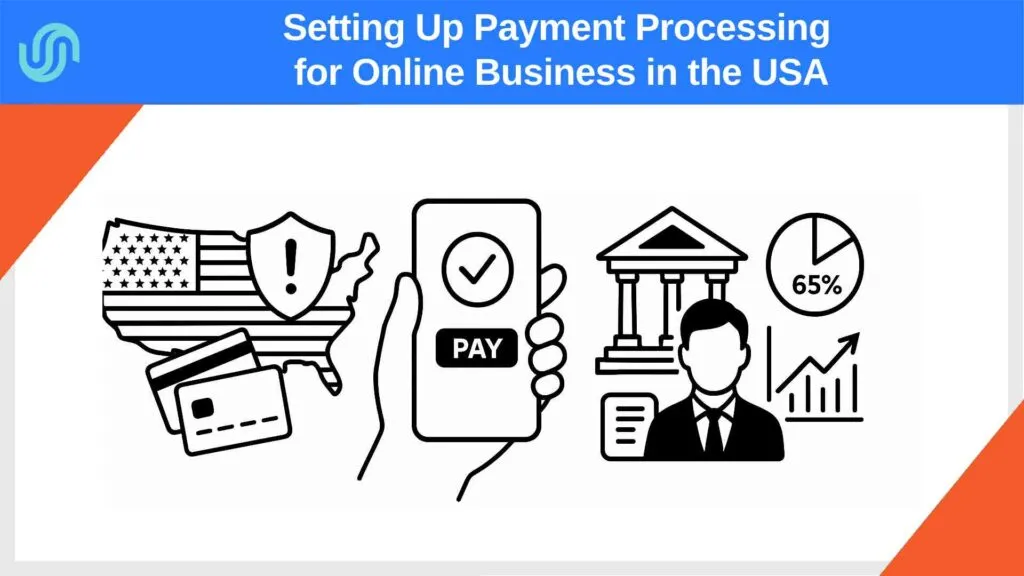The United States is a lucrative but highly regulated market for online payments — especially if you’re running a high-risk business. Whether you’re in iGaming, crypto, supplements, adult content, or forex trading, securing reliable payment processing for online business USA is complex but achievable.
In this step-by-step guide, we’ll cover everything from US payment methods and compliance issues to substance requirements and working with processors that may not love high-risk verticals.
If your business is adult/dating, start here.
1. Why High-Risk Businesses Struggle with US Payment Processing
High-risk merchants face more scrutiny from US acquirers due to:
- Higher-than-average chargeback ratios
- Industry reputation concerns
- Legal restrictions (e.g. gambling, CBD, adult, etc.)
- Cross-border ownership or opaque corporate structures
Stat: The global annual chargeback volume is projected to rise from 261 million in 2025 to 324 million by 2028, with the U.S. leading in average chargeback value at $110 per dispute (sources: chargebacks911.com, Mastercard).
2. US Payment Processors: Who Typically Rejects High-Risk Merchants
Well-known U.S. processors like Stripe, PayPal, and Square are often cited as unfriendly to high-risk industries — especially for startups or international entities. Reasons include:
- Internal risk policies
- Card scheme pressure
- Automated account terminations for elevated dispute rates
Disclaimer: Information in this article is based on publicly available sources and professional experience. We do not guarantee the accuracy of any individual processor’s current policy. Please do your own due diligence.
Examples of documented restrictions:
3. US Bank Payment Solutions: Availability for High-Risk Merchants
While US-based bank solutions (ACH, wire settlements, etc.) offer faster, cost-effective transactions, they’re typically reserved for:
- U.S.-registered corporations
- Merchants with real substance in the U.S.
- Medium-to-low risk verticals (unless extra due diligence is passed)
However, some niche high-risk–friendly acquirers or agents may cooperate — especially if you provide:
- Strong compliance processes
- Chargeback mitigation
- Clear U.S. economic ties
4. Accepted Payment Methods in the USA for High-Risk Merchants
The most commonly used payment methods in the United States include:
- Credit & Debit Cards – Still dominant and typically required
- ACH / eChecks – Harder to access for high-risk, but valuable
- Digital Wallets – Rapidly growing (Apple Pay, Google Pay, PayPal)
- Buy Now, Pay Later (BNPL) – Limited availability for high-risk
- Crypto – Gaining traction as an alternate route for restricted verticals
Stat: In North America, credit/debit cards represent 65% of online payments, while digital wallets account for 30% (sources: capitaloneshopping.com, globenewswire.com, en.wikipedia.org, bluesnap.com, en.wikipedia.org). Additionally, 53% of Americans used digital wallets more often than traditional methods in 2023, and 65% tried one at least monthly (source: capitaloneshopping.com).
5. Step-by-Step Setup for High-Risk Payment Processing in the USA
a) Prepare Legal Documentation
- Corporate documents (LLC/Corp)
- KYC/UBO details
- Refund & Privacy policies
- Evidence of fulfillment or delivery
- Chargeback ratio disclosure
b) Ensure U.S. Presence and Substance
Banks and processors now often demand proof of substance for high-risk accounts:
- U.S. bank account for settlement
- Registered U.S. entity (e.g., LLC)
- Real substance: office, employees, contracts
- U.S. registered agent or representative
- Evidence of U.S.-based economic activity
The OCC’s guidance confirms that acquirers should validate a merchant’s legitimate connection to U.S. commerce before approval (sources: en.wikipedia.org, capitaloneshopping.com).
c) Choose the Right Integration Partner
- High-risk friendly payment aggregators
- White-label gateway providers
- PSP-neutral consultants (e.g., WiseAlt) for multi-MID or offshore/onshore solutions
d) Implement Advanced Fraud Protection
- 3D Secure 2.2
- Chargeback alert systems
- Transaction scoring tools
- Manual review for large orders
e) Ensure Compliance
- PCI DSS
- OFAC/Sanctions screening
- FinCEN MSB registration (for crypto or forex verticals)
6. Avoid Common Pitfalls
- Virtual addresses alone don’t prove substance
- Lack of U.S. representation often leads to rejection
- Some processors terminate high-risk accounts without warning
- Ignoring chargeback defense tools can be costly
7. How WiseAlt Helps Navigate U.S. High-Risk Processing
WiseAlt supports “high-risk” businesses by structuring compliant setups:
- Offshore merchant accounts with U.S. settlement layers
- Crypto-to-fiat conversion strategies
- Collaboration with integrators or tech-first acquirers
- Advice on documentation, fraud defense, and MID stewardship
We could guide you through a tailored solution based on your vertical, risk exposure, and U.S. presence.
Conclusion: High-Risk Doesn’t Equal Impossible
Entering the U.S. market as a high-risk online merchant is certainly tougher today — but with proper documentation, compliance structures, local presence, and thoughtful partners, it’s achievable.
✅ Contact WiseAlt to explore how to set up your payment processing online business USA with confidence.
Disclaimer:
This article is provided for informational purposes only. WiseAlt does not represent or endorse any specific payment provider. Always perform your own due diligence or consult professionals before making financial decisions.


